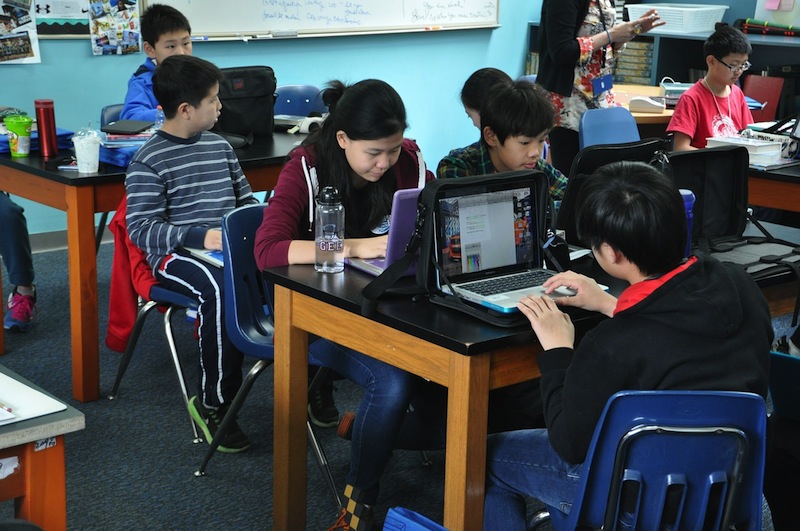
We thank Magdalena, life coach in the Bay Area, for this useful article!
Back to school anxiety in a new country
Starting a new school has always been a load of stress for children. A new year begins, in a new class, with new friends, new teachers and new challenges. Even parents feel some apprehension facing this plunging into a new situation which will fill the days and the minds of their children, and will affect their overall behavior. The teacher becomes a substitute parent, who shares his knowledge and influences the thinking of children. At the social level, the school involves the children in various types of interaction, even, at times, enabling them to test their behavior. The playground during recess is also an experimental lab on relationships for many students.
It follows that the school demands of the parents an attitude of trust. There is agreement between the school and the parents that the child will develop through relationships with others (friends), with authority (teachers), and with himself (opinions and choices).
 When the return to school takes place in a new country, a multitude of further changes add to the idea of a new beginning. We must deal with the impact of a new culture, master a new language, enter an unknown social milieu, or a specific educational theory. In a new country it is necessary to understand the local education system in terms of methodology, grades, academic expectations, discipline, etc.. For example, in some countries, school marks will be awarded with more severe criteria than in others, which may surprise, disappoint and lead to misinterpretation of the academic achievement. Cultural differences also affect the relationships of children. Some French parents are surprised by the positivism encouraged by American teachers, who congratulate each individual effort with a regular “great job” or “awesome”, while they themselves are generally self-controlled and often restrained in the face of compliments.
When the return to school takes place in a new country, a multitude of further changes add to the idea of a new beginning. We must deal with the impact of a new culture, master a new language, enter an unknown social milieu, or a specific educational theory. In a new country it is necessary to understand the local education system in terms of methodology, grades, academic expectations, discipline, etc.. For example, in some countries, school marks will be awarded with more severe criteria than in others, which may surprise, disappoint and lead to misinterpretation of the academic achievement. Cultural differences also affect the relationships of children. Some French parents are surprised by the positivism encouraged by American teachers, who congratulate each individual effort with a regular “great job” or “awesome”, while they themselves are generally self-controlled and often restrained in the face of compliments.
Some parents are also worried about the quality of schooling in their host country. They compare it with the only system they really know, namely that of the country from where they come. And yet other types of learning come into play that make a comparison difficult; for example, the discovery of a new language, adapting to another culture, or even the development of a spirit of openness to differences.
The start of school in the new country is surrounded by an aura of mystery, full of strange things, for both children and parents. And any news item can be a source of insecurity, distrust and anxiety. A transfer of stress from the adult to the child may increase the general distress, while the child asks for nothing more than to be reassured. Also, depending on their school experience, parents project their own childhood memories about the beginning of school, and this can further load the experience of their children with positive or distressing notes. The signals sent out by the child experiencing great anxiety and to which we must pay attention can be behavioral (irritability, aggression, regression) or somatic (headache, stomach ache, nightmares). Providing your child with an attentive and respectful listening, will give him the opportunity to confide his fears and unburden himself. Parents who focus on the positive aspects of the new school will be able to alter the child’s perception of it. If after a few months the symptoms persist, it is best to seek advice from a professional or even consider a change to a more suitable school. For some children, the culture shock of a local school may be too strong, and they might feel more confident in a private school, for example the one of the country they come from. Parents can also feel more comfortable in this type of school, and this will also help to maintain a comforting cultural link.
In a new environment, parents may ask themselves what is their role. If they can keep informed about the behavior and the level of achievement by their child through marks and, with some schools, a report record from the school, they may also participate more actively in school life. Becoming a member of the schools’s parent teacher group or similar association of the school parents can be a chance to get a role and a specific function. For those parents who do not know the local procedures, it can be a way to further understand how the organization is run. Be careful though not to become too interventionist, which could call into question the trust given to the educational authority. Parents that are too present can result in excessive control over the lives of their children. Over-protection may be a reflection of a non – separational relationship with one’s child. It shows also a lack of confidence in the resources of the child, who is treated as fragile and unable to become more independent; when in fact it is important that the child explores other environments outside of the family network in order to build a solid sense of self. When relocating to a new country, the school can become a familiar space just for the child, who holds to it for the whole duration of the stay.
Parents that are present at school reassure the child, parents that are too present frustrate his need for autonomy.
To help their child to be well integrated into his new school, in his new country, parents should comfort him and be understanding of his often legitimate fears. Adapting can take some time, but gradually the child will integrate the elements of the new environment. Offering the child relaxation through an extra-curricular activity, and periods of rest in his new home will help to lessen the tension.
For parents who feel very concerned, it is advisable to get in touch with other parents and the teachers, to clear any doubts and misunderstandings. At the same time, the return to school for the children may provide an opportunity for the adults to venture into a new personal or professional activity. This way, during the day everyone will go through experiences that can be shared when the family gathers again.
The return to school for a child recently arrived in a foreign country is another challenge of international mobility, but it can be dealt with more easily by exploring the cultural and linguistic differences, and by having confidence in the pedagogic skills of the new school , in the resources of the child and by supportive, non-over anxious parents.




